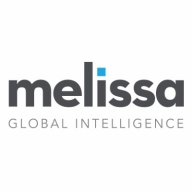

Talend Data Quality and Melissa Data Quality compete in data management, with Talend offering greater features for data integration, while Melissa excels in data validation accuracy.
Features:Talend Data Quality is known for strong data profiling, data cleansing, and monitoring, making it a comprehensive data management solution. Melissa Data Quality specializes in address verification, geocoding, and real-time contact data enhancement, making it ideal for businesses focusing on accurate data verification.
Room for Improvement:Talend could improve on ease of setup and address better data visualization tools. It also lacks out-of-the-box components for some applications. Melissa could enhance its integration capabilities with third-party platforms, provide more flexible customization, and improve its batch processing speed for large datasets.
Ease of Deployment and Customer Service:Talend supports both cloud and on-premises deployment, offering flexibility and adaptability. It is characterized by a steeper learning curve. Melissa offers a straightforward installation process with robust customer service, allowing for quicker integration and support.
Pricing and ROI:Talend’s higher initial cost is balanced by its extensive features that deliver high ROI for comprehensive data solutions. Melissa provides a cost-effective setup with a rapid ROI, focusing on specific data-quality functions essential for companies needing accuracy and precision.
| Product | Market Share (%) |
|---|---|
| Talend Data Quality | 4.9% |
| Melissa Data Quality | 2.9% |
| Other | 92.2% |

| Company Size | Count |
|---|---|
| Small Business | 12 |
| Midsize Enterprise | 3 |
| Large Enterprise | 14 |
| Company Size | Count |
|---|---|
| Small Business | 9 |
| Midsize Enterprise | 4 |
| Large Enterprise | 4 |
Data Quality Components for SSIS
This suite of data transformations for Microsoft SQL Server Integration Services (SSIS) delivers the full spectrum of data quality including data profiling, data verification, data enrichment and data matching. With an intuitive interface and drag/drop capabilities, this powerful toolkit makes it easy to unify data into a single version of the truth for Master Data Management (MDM) success.
We monitor all Data Quality reviews to prevent fraudulent reviews and keep review quality high. We do not post reviews by company employees or direct competitors. We validate each review for authenticity via cross-reference with LinkedIn, and personal follow-up with the reviewer when necessary.